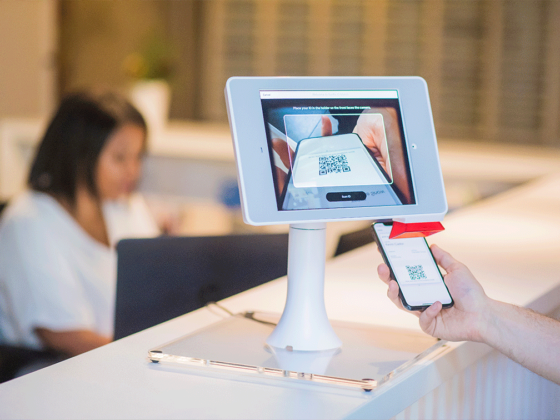In October 2023, a massive data theft at the Motel One chain was revealed, where nearly the entire guest list since 2016 was stolen. This list included billing addresses, birthdates, and other personal data. Incidents like this are a good reminder to review your own data protection measures. As an event organiser in 2023, you’re likely familiar with the General Data Protection Regulation (germ.: DSGVO). However, if you’re still navigating the complex rules and regulations, you’re in the right place! In this blog post, we’ll guide you through the world of GDPR (DSGVO), specifically tailored to the challenges and opportunities for event organisers like you.
Interested in GDPR (DSGVO) -compliant ticketing?
For egocentric Systems, GDPR (DSGVO) is not only a quality feature but also a responsibility. How do we implement this with our system?

GDPR (DSGVO) and events
The GDPR (DSGVO) may seem complex at first, but it offers you the opportunity to gain the trust of your participants and make your events safer and more professional.
Fun fact: Zettabytes of data are generated globally each year. Statista estimates that 126.32 zettabytes will be generated in 2023. (A single personal data record with name, address, email, and phone number requires approximately 0.001 GB. 126.32 zettabytes comprise a data volume of 126,320,000,000,000,000,000 possible data records). So, this topic is crucial.
In this guide, you will learn how to use the GDPR (DSGVO) to your advantage while ensuring your events comply with current legal requirements. Dive into the world of data protection with us and discover how to optimise your events.
A little disclaimer before we get started:
This article does not claim to be legal advice. You should always clarify specific implementation guidelines and any changes due to the GDPR (DSGVO) with your trusted legal advisor.
Important data protection principles for event organisers
In this section, we focus on the basic principles that should characterize every GDPR (DSGVO)-compliant event.
Data Minimization: Less is More
The principle of data minimization is simple: only collect the data that is absolutely necessary for your event. Complying with data protection laws not only fulfills legal requirements but also demonstrates respect and professionalism towards your customers.
Earmarking: Data Use with a Clearly Defined Purpose
Every data set you collect should have a specific, defined purpose. Be transparent about why certain information is needed and how it will be used. This transparency strengthens trust in your event and underscores your credibility as an organizer.
Transparency and Accountability: Open and Responsible Data Management
As the organizer, you are responsible for the data collected. This means you should be able to account for its use at all times. Clear and transparent communication about your data protection practices is essential for creating trust and security among your customers. Data protection compliance is an ongoing process and a commitment that extends beyond individual events. With these basics, you lay the foundation for a successful and GDPR (DSGVO)-compliant event.
1. Preparation of your event with the GDPR (DSGVO)
Step-by-Step Planning with a Focus on Data Protection
Start with detailed planning that incorporates data protection aspects from the outset. This includes selecting the right tools and platforms and designing registration forms and communication strategies that comply with data protection regulations.
Obtaining Consent: How to Do It Right?
Obtaining participants’ consent for data collection and processing is a core component of the GDPR (DSGVO). Ensure that your registration processes are clear and understandable, and that customers explicitly consent before personal data is collected. Emphasize the principles of voluntariness and clarity.
Data Protection-Compliant Handling of Participant Data
Once data is collected, it must be securely managed and protected. Implement appropriate security measures to prevent data leaks or unauthorized access. Ensure that data is kept only as long as necessary and then properly deleted.
Preparing a GDPR (DSGVO)-compliant event requires care and attention to detail. By following these steps, you will ensure that your event is not only successful but also fully compliant with data protection regulations.
What are particularly sensitive contact points for customer data in your daily business?
Online Ticket Shop: Security and Data Protection
The online ticket shop is often the first point of contact between organizers and participants, where sensitive data such as contact information and payment details are collected. Ensuring this process is GDPR (DSGVO)-compliant is crucial, involving secure data transmission and storage, as well as transparent communication about data usage.
CRM Systems: Data Centralization with Risks
CRM systems are central to managing customer relationships and store detailed information about your customers and prospects. Since they contain a large amount of personal data, they must be specially protected to ensure GDPR (DSGVO) compliance.
Newsletter: Consent and Transparency
When sending newsletters, it’s important to obtain recipients’ consent and clearly inform them which data is used for which purpose. Unsubscribe options must also be simple and efficient.
Interfaces as Points of Attack
The interfaces between different systems, such as between the ticket shop, CRM, and newsletter tool, are potential weak points for data breaches. Data must be transferred and processed securely to minimize risks.
Advantage of an Integrated Solution
Bringing together functions such as ticket sales, CRM, and newsletter dispatch in an integrated system can be highly advantageous. It simplifies the management and monitoring of data flows while reducing the number of interfaces, thus minimizing the risk of data breaches.
By understanding and carefully managing the GDPR (DSGVO) in these key areas, you can ensure legal compliance and strengthen your customers’ trust in you
More questions about data protection in ticketing?
How does our system meet your data protection requirements? Our event experts will be happy to show you in a no-obligation demo.
2. Realisation of the event under the microscope of the GDPR (DSGVO)
Data Protection-Compliant Event Design
Ensure that all processes and activities during the event adhere to data protection rules. This includes securely handling customer information, complying with data protection guidelines when presenting content, and protecting participants’ privacy.
Legally Compliant Image and Sound Recordings
If you plan to record images or sound, ensure it complies with data protection regulations. Obtain consent and inform participants about the purpose and use of recordings.
Check-in and Guest Management: Efficient and Secure
Design the check-in and guest management processes to guarantee data security. Avoid displaying sensitive customer information publicly and restrict data access to authorized personnel only.
By integrating these aspects into your event planning, you not only ensure GDPR (DSGVO) compliance but also enhance participants’ trust and satisfaction

3. After the event: Don’t forget data protection!
Data protection also plays a crucial role after the end of the event. Post-processing in compliance with the GDPR is an important step in ensuring the confidentiality and security of participant data in the long term.
Correct Handling of Data After the Event
After your event concludes, it’s crucial to manage collected data in compliance with GDPR (DSGVO) requirements. Assess whether the data is still necessary; if not, securely delete it. Adhere to specified retention periods and responsibly remove unnecessary data.
Obtaining Feedback in GDPR (DSGVO) Compliance
When gathering participant feedback, ensure GDPR (DSGVO) compliance by informing participants about data use and obtaining their consent. Integration into ticket shop purchases can simplify this process through voluntary consent.
Managing Data Breaches
In the event of data breaches, prompt action in accordance with GDPR (DSGVO) guidelines is essential. Establish a protocol for handling breaches, promptly notifying authorities and affected individuals as necessary. Complying with GDPR (DSGVO) post-event is not just a legal obligation; it demonstrates respect for participants. Thoughtful data management reinforces trust and enhances your reputation as a responsible organizer.
4. Effective collaboration with your data protection officer
Understanding the Role of the Data Protection Officer
The Data Protection Officer (DPO) serves not only as a controller but also as an advisor and partner in implementing data protection-compliant processes. They assist in identifying risks and providing solutions to mitigate them.
Data Protection Impact Assessment: What is It?
A data protection impact assessment may be necessary for certain types of events. The DPO can assist in conducting this assessment to ensure accurate risk evaluation and mitigation.
Training and Counseling for Your Team
An essential aspect of data protection is ensuring all team members are aware and informed. The DPO can offer training and workshops to educate your team on data protection. Collaborating effectively with the DPO helps minimize data breach risks and ensures compliance with current legal requirements for your event.
5. The most important facts at a glance
- Remember the key points of this guideline: data minimization, purpose limitation, transparency, and close cooperation with the Data Protection Officer (DPO).
- The GDPR (DSGVO) will remain pivotal in event management in the years ahead. View GDPR (DSGVO) compliance not just as a duty but as a chance to enhance customer trust.
- Stay informed about data protection trends to ensure ongoing compliance with legal requirements for your events.
German startup, German standards – and not just when it comes to the GDPR (DSGVO). egocentric Systems is ready for more data protection with its solution.

The reason why your ticket shop needs a digital waiting list
READ NOW
Electronic access control for events: why it is essential and what options are available
READ NOW
Why the ticketing solution from egocentric Systems is inspiring more and more event organisers
JETZT LESEN